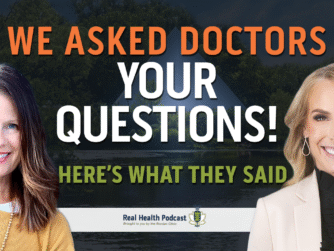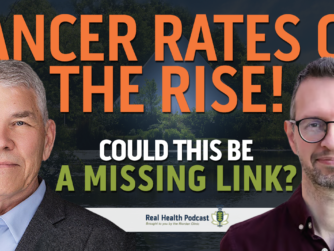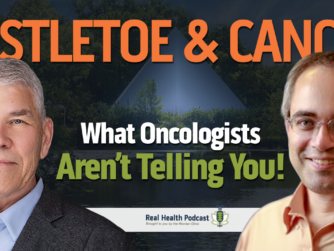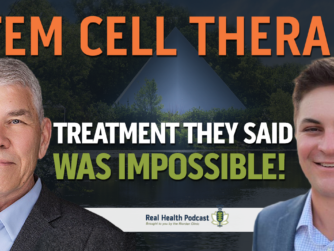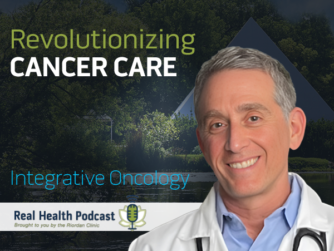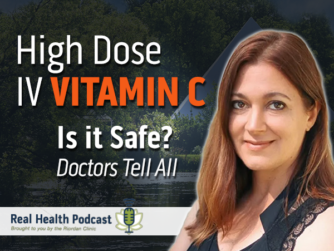In this episode of the Real Health Podcast, host Dr. Ron Hunninghake, MD, is joined by Dr. Dan Rubin, ND, FABNO, Founding President of the Oncology Association of Naturopathic Physicians (OncAP) and Founder of Naturopathic Specialists, LLC, and Dr. Lucas Tims, ND, FABNO, of the Riordan Clinic. They discuss the role that naturopathic medicine can play in oncology, credentialing for naturopathic practitioners, and Dr. Rubin’s connection to the Riordan Clinic.
Watch the Podcast
Thank You to this Episode’s Sponsor
Riordan Clinic Supplement Store
Links
Naturopathic Specialists, LLC: https://www.listenandcare.com/
Riordan Clinic: https://riordanclinic.org
Episode Transcript
Disclaimer: The information contained on the Real Health Podcast and the resources mentioned are for educational purposes only. They are not intended as, and shall not be understood or construed as, medical or health advice. The information contained on this podcast is not a substitute for medical or health advice from a professional who is aware of the facts and circumstances of your individual situation. Information provided by hosts and guests on the real health podcast or the use of any products or services mentioned does not create a practitioner patient relationship between you and any persons affiliated with this podcast.
Intro: This is the Real Health Podcast brought to you by Riordan Clinic. Our mission is to bring you the latest information and top experts in functional and integrative medicine to help you make informed decisions on your path to real health.
Dr. Ron Hunninghake: Well, welcome everyone. It’s Dr. Ron Hunninghake and I’m hosting today and another episode of the Real Health Podcast. And we are delighted, and I say we. Dr. Lucas Tims is on with me today. And as our guest, we have Dr. Dan Rubin, who was the founding president of Naturopathic Oncology. And we’re going to get to that. Dan, we’re so glad to have you on this little talk show. Welcome.
Dr. Dan Rubin: It’s so awesome to be here.
Dr. Ron Hunninghake: So, I want the audience to know a little bit about you before we get into the discussion of naturopathic oncology. You came to the Riordan Clinic way back when. What’d you say? 1998? What was the occasion for you to be visiting the Riordan Clinic, which was back then the Center for the Improvement of Human Functioning?
Dr. Dan Rubin: Yeah, it was because I graduated naturopathic medical school August of ’97, and I had the article from medical hypotheses, intravenous ascorbia as a potential chemotherapeutic anti-cancer agent. And I’m like, “I got to go see it. I got to go to who wrote it.”
Dr. Dan Rubin: And so, in ’98, I mean, not even a year after graduation, I was able to get down there and I spent two weeks there and that’s in getting to meet you. And Dr. Hugh and Neil, Dr. Neil Riordan, and just everybody. I just remember it so clearly, it was so impactful, and it still has impact today. Because I still think about my time at the Riordan Center or the Center for the Improvement of Human Functioning.
Dr. Ron Hunninghake: It is fascinating how people, it’s a kind of milestone in a lot of, it was certainly was a milestone in my life to come and be at the Riordan Clinic to see that there were greater possibilities in the realms of health. Of course, you were a naturopathic physician at that point, and you had a vision there, but how did your visit to Riordan Clinic change your point of view as to how naturopathic medicine could have a role to play in oncology?
Dr. Dan Rubin: Yeah, I mean that was already my interest, and it was learning how you could really look at biochemistry with a lot of the specialized testing and how you could really engage scientific principles along with creativity, which is really the foundation of where I start from with protocols is creativity and philosophical approaches to somebody’s care and then really blend them with the science.
Dr. Dan Rubin: I mean, I remember Neil Riordan and I doing a test because we were really curious about how much calcium offset there was or what osmolarities there were. If you were to put vitamin C in lactated ringer bag versus the sterile water bag. And at the time I think of standard 15 gram IV vitamin C was always given at the Riordan Center in lactated ringers, and we just gelled so well together, right up front when I got there. And so it was really easy.
Dr. Dan Rubin: We just walked into another building and tested the hypothesis and came to a conclusion and I was like, “That’s real medicine.” That was what was going on at the Center for the Improvement of Human Functioning. You had onsite testing, food. I mean, it just, I’d never seen anything like it and there still isn’t anything like it that I know of. I mean, I think many have probably tried, but the original still stands, and it was impressive because it was all right there. And the staff seemed to be working as one on different projects, but it all came down into how you get the best treatment and the best care for the patient. That’s what I came away with.
Dr. Ron Hunninghake: So Dr. Riordan encouraged curiosity. He had an open mind. He wanted people to see that there could be a better way and that was our job to help them find it. So I want to know, how did you find Dr. Lucas Tims? Where did you two start out together? Because there’s an interesting story there.
Dr. Dan Rubin: I think we met at the OncANP Conferences and just through or mutual affection and love for naturopathic oncology and mutual friends.
Dr. Lucas Tims: Yeah. Dan won’t remember this, but when I was in at school at Southwest College of Naturopathic Medicine, which was, we both went to school there, but he was obviously before me, he came and gave a lecture for our oncology elective that we did. And I think it was my third year of school. And at that point I was still kind of undecided on which way I might want to go with my career and practice.
Dr. Lucas Tims: And that lecture that you gave there along with my then girlfriend, now wife being diagnosed with cancer were the two things that came together right about the same time that kind of set the seed for me in terms of wanting to work with cancer patients.
Dr. Dan Rubin: Awesome.
Dr. Lucas Tims: So I have a lot that I owe to you for taking me down this path.
Dr. Dan Rubin: Thank you.
Dr. Lucas Tims: Yeah. I mean, it’s kind of crazy here because I’ve got two colleagues on this podcast right now that I really look up to and respect a lot in different ways, but yeah. And then Dr. Rubin, your part in forming the board of naturopathic oncology, which I know we want to talk about that also, paved the way massively for not only myself, but all the other FABNOs that have come since, so maybe we should talk a little bit about that.
Dr. Ron Hunninghake: Yeah. Better define FABNO for us because there’ll be people listening in that won’t know what that is.
Dr. Dan Rubin: Well, FABNO is Fellow of the American Board of Naturopathic Oncology, and the American Board of Naturopathic Oncology is sort of the certification arm of the Oncology Association of Naturopathic Physicians or OncANP, which was founded in 2004, and its founding was motivated by a real desire to protect the public.
Dr. Dan Rubin: And what I mean by that is at graduation, all naturopathic doctors take an oath to protect the public, and further was the use of non-conventional treatments was really on the rise in the late ’90s, and then the early 200s, obviously establishing clinics and our practice. But there was no…
Dr. Dan Rubin: Two things. One, in the state of Arizona where I live and practice, it was actually unprofessional and illegal to call yourself a specialist or refer to yourself as a specialist, without some kind of oversight by the board. And so in order to gain oversight by the board and recognition, rather by the board, you had to have some kind of certification.
Dr. Dan Rubin: So one, I wanted that because I was only seeing people with cancer. I didn’t do anything else at the time. And so how would people find me? And I wanted to let them know that this is what I do. And at that time, and you guys will know, oncology was moving so quickly. This is when small molecules were developing and anti-angiogenic agents and more biological agents versus just straight, standard chemotherapy. And so there was a lot going on and I was keeping up with it and having trouble doing conventional naturopathic.
Dr. Dan Rubin: So the general practice person, I couldn’t keep up with it because it wasn’t, you have to be interested in that stuff and you have to have the time to do it. And that’s part of motivation. That was the motivation for protecting the public is we wanted the naturopathic doctor to have some kind of expertise.
Dr. Dan Rubin: And I also am a staunch and was back then and still am now advocate for specialization in naturopathic medicine. I think my opinion, we owe it to our patients to be true experts. Some of the purists and nature pure people in our profession will disagree, probably continue to disagree with me, which I respect and understand, but it’s just not how I practice and seemingly not how the modern day practitioner practices in naturopathic medicine, and that was the reason we founded the OncANP.
Dr. Ron Hunninghake: Well, I think the public, too, has been moving in the direction of whole person care. And there was a sense that the oncologists were just focusing on the tumor cells. We got to kill the tumor cells, but what about the rest of the human being and what can we do for them that will help improve the outcomes of conventional therapy? So the idea of integration, because I remember for the longest time, everything that we did at Riordan Clinic was alternative. It sounds like it was either/or, and I think one big step that you took was making it both and that both were important, not just one or the other.
Dr. Dan Rubin: Thank you for recognizing that. And that was really, I had expertise in integrating meeting with oncologists, right. I said, “Write the doctor a letter. Let them know what we’re doing. Be very open and transparent and scientific about it and I still practice that way. It’s so important.
Dr. Ron Hunninghake: Yeah.
Dr. Lucas Tims: Yeah. And I want to just jump in there too and say on the heels of the setting up the ABNO Board and creating that as a specialization, we’ve now seen a trickle-down effect where we’ve got a number of other specializations and board specialties that have come up in naturopathic medicine. That, the naturopathic oncology was the first.
Dr. Dan Rubin: Yeah.
Dr. Lucas Tims: And so, I do think that you were a bit of a, you were really a thought leader in terms of getting our profession moving that way. And I think that we’re starting to see that come to fruition because you’re right, especially oncology. I mean, it’s not something you just dabble in. I mean, you really need to know your stuff, and naturopathic oncologists really pride themselves in not only knowing about natural therapies and supportive adjunctive therapies, but also in, and having a very firm understanding of what’s going on in the traditional side as well, correct?
Dr. Dan Rubin: That’s a hard job. Absolutely. We had a student in here the other day in our clinic, which is where I am right now. And I was talking to him about that. I’m like, “You got to know both, dude.” I’m like, so you got to really think about what you want to do, because like you said, Dr. Tims, you’re obligated to know both.
Dr. Lucas Tims: Yeah.
Dr. Ron Hunninghake: How much, just again, for our listening public, what are the standards to become certified as a FABNO practitioner?
Dr. Dan Rubin: So I’m not on the board anymore and they are published on the OncANP or ABNO website, but I don’t think that they’ve changed. I think you need to pass a board exam and you need to qualify to take that board exam by having a certain number of patient care hours of taking care of people with cancer. And then you either need to have done a naturopathic oncology residency, which would take care of the hours, or you need to be in private practice I think at least five years, with I think a 90% of it being oncology. And then you need to either have published one or two articles regarding direct patient care in the peer reviewed literature. Or you have to write up a series of cases that are then reviewed by the examination board.
Dr. Lucas Tims: And there’s multiple pathways because obviously we’d love naturopathic doctors to all have done a two- or three-year fellowship-type residency in oncology, but those opportunities are still unfortunately few and far between. I was lucky enough to be able to do one of those through Cancer Treatment Centers of America, but having those alternate pathways where more seasoned NDs these that have been in the trenches for several years seeing lots of oncology, they could also be able to sit for those boards as well. So I appreciate that you guys set it up that way.
Dr. Dan Rubin: Totally.
Advertisement: There’s a lot more to this conversation, and it’s coming up right after a quick break. Today’s podcast is brought to you by LivOn Labs, makers of liposomal vitamins and supplements. LivOn uses a liposomal encapsulation technology to protect nutrients from destruction in the digestive system. This allows for more efficient delivery of essential vitamins and nutrients. Choose from various supplements that support health and wellbeing such as lypo-spheric, vitamin C, magnesium, glutathione, and more. To learn more visit LivOn Labs. That’s L-I-V-O-N labs.com.
Dr. Ron Hunninghake: So Dan, when you see a patient again, I’m thinking of our audience, when you see a patient, what are you going to focus on as a naturopathic oncologist that’s going to be a little bit different than just a regular oncologist?
Dr. Dan Rubin: Yeah, that’s a good question, because it really depends on where they are in the process or the journey or the adventure at the time. I mean, we know that the woman who has a biopsy of a stage zero carcinoma in situ of the breast, we’re going to approach differently than obviously somebody with metastatic pancreatic cancer.
Dr. Dan Rubin: And so I think, I usually like to, I want to know where it started and what I mean by that is, and they say, “Well, what do you want to know? When I was diagnosed or when my first scan was?” And I go, “No, I want to know what day one was for you.” And a lot of times they’re like, “Oh, well this dates back to when I was 32 years old,” and we all see that and I kind of take it from there. And then of course it depends on if they are on conventional treatment and what’s the importance or nowadays we’re seeing a lot of people coming to us recently diagnosed, which is actually different than in the past because usually people would come to us, “Okay, now we’re ready to try something different.”
Dr. Dan Rubin: But now people are saying like, “Hey, I want to know your opinion on what I should choose or which way, or just get some input.” They’re valuing the naturopathic oncologist’s input along with the conventional input and helping to pro and con things out. And so I always say you’re a doctor first, all of us, anybody who treats patients with some kind of doctorate behind their name is a doctor first. Then you can become a specialist. And I say, as a naturopathic doctor, I’m a specialist in naturopathic medicine.
Dr. Dan Rubin: As a medical doctor, Doctor Ron, you’re a specialist in medicine. Then you can become a subspecialist. Then I’m a naturopathic oncologist. And so we all learn the human body. The human body isn’t different, no matter where you go to school, it’s just how you approach it, what you create in terms of your treatment plan and how you philosophies about how you’re going to get there. And that’s how I derive my treatment.
Dr. Ron Hunninghake: I think Dr. Hugh would be excited with what you just said, because what occurred to me is that a naturopathic oncologist is a specialist in the whole person who has cancer.
Dr. Dan Rubin: Yeah.
Dr. Ron Hunninghake: The whole person. And there are so many, the other issue that comes in here is that there’s a dazzling array of so-called alternative or natural or different ways to approach cancer, that people get overwhelmed. And they’re looking for help in a way that doesn’t interfere with the best of what modern oncology has to offer us. And so that’s a tricky business.
Dr. Dan Rubin: Especially with the internet and the availability. I used to lecture, this is back in the early 2000s and sometimes I said, “Internet plus credit card equals a problem for a lot of people.” They’re buying. No, I remember we had a naturopathic physician bring in a patient, and the naturopathic doctor whose family practice came to the specialty visit at my office with the patient. And he was on a protocol, but the protocol that it was on, I just looked at him like this is prostate cancer protocol, but the person had pancreatic cancer.
Dr. Dan Rubin: And so sure enough, we went on the website where they got it, and it was listed under prostate. And so it’s being able to distill down all of the things that Dr. Tims, you know that people bring to us, especially nowadays with all the info and all the social media and all the promotion of products and fads and diets and lifestyles and blah.
Dr. Lucas Tims: Yeah. Yep.
Dr. Dan Rubin: It’s our responsibility. So you could spend a whole consult on that.
Dr. Lucas Tims: Mm-hmm. No doubt, no doubt. And I think that that’s a key way in which we can help patients also is not only by recommending things or telling them what may help them, but clearing out all the noise of what they should not be doing and not be focusing on. And I say, patients, I say to them all the time, that especially when they come to me taking just a gazillion supplements or taking the kitchen sink approach basically is that even though there’s money spent to get set up to see me, I’m going to save you money by taking you off the stuff that you don’t need to be spending money on.
Dr. Lucas Tims: And so we see that time and time again, but the DIY approach is out there and a lot of people unfortunately do take that and end up spending money and time and resources on things that are not really meant for them, or they’re not taking it the right way or combining it with the right things and so that’s a great point you made, Dan.
Dr. Dan Rubin: Thank you.
Dr. Ron Hunninghake: Where do you think this naturopathic oncology’s going to go? I mean, we see our practices growing because people are wanting the professional help that we can provide, but is this going to be a growing area do you think in the field of oncology or do you think oncologists are going to continue to accept naturopathic oncology?
Dr. Dan Rubin: Yeah, they have to because –
Dr. Ron Hunninghake: They have to.
Dr. Dan Rubin: … we’re amazing and we do something that nobody else can do. No other practitioners, naturopathic doctors are naturopathic doctors and nobody else is a naturopathic doctor. Nobody else practices naturopathic medicine. You have to go to school and be born into that. I’m not saying that there’s not people who don’t practice integrative or non-conventional medicine, but we’re the experts in this. We built this platform and we are doctor level practitioners. And so our philosophies are such that, like you said, we’re specialists in the approach to the whole person with cancer.
Dr. Dan Rubin: And so I have seen probably starting late 2020 and gaining strength through 2021 and especially this year, some of the bigger institutions out here are no longer as favorable to integration. In fact, one institution out here, I used to go lecture at, get grand rounds at, be very close to, still have referring physicians from there, but the overall attitude has reverted back to the 1990s to where it’s like, don’t take an antioxidant, don’t eat soy. I mean, just stuff that data has refuted. Clear data.
Dr. Dan Rubin: And we had come through that and spent so much time coming through that for the betterment of the human experience for the person with cancer and I’ve seen not the sort of individual practitioners, but the bigger academic institution. So I don’t know what that’s about. And so we have some work cut out for us again, but the public wants it and is calling for, and the recognition is that what we’ve been doing all along once again, bio identical hormones, like probiotics. Right now, you see what’s going on with the microbiome. It’s like, “We did it because it made sense.” And now there’s science to back it up.
Dr. Dan Rubin: And I don’t know Dr. Ron, Dr. Tims, there’s a real problem with science in some of this is the human being. You can’t necessarily fully understand yourself because you don’t know, there’s no conclusion in our and humanity hasn’t concluded how humanity became, so how can we be so cavalier that we could think that we could understand ourselves scientifically when we didn’t even make up ourselves? So it’s like we’re trying to understand. So you have to be creative. You have to have an aspect of what the human body needs, and it’s not all manufactured medicines. And so that’s my perspective. Yeah. So I think it’s… Go ahead. Sorry.
Dr. Ron Hunninghake: Couple weeks ago, I interviewed Glenn Sabin who wrote a book, the “N of 1.” You probably are familiar with it. He’s a gentleman who had a cancer. It was leukemia. And he, over the course of 20 years, worked in close association with a number of oncologists and was able to find a way to cure his leukemia. But what he said is it was an N of 1, which means that each person that has cancer is a unique case.
Dr. Ron Hunninghake: You can have 10 cases of lung cancer, but there’s going to be 10 different differences in what’s going on in that person’s life. What were the contributing factors? What’s their genetic, epigenetic factors, things like that. And I think this is where naturopathic medicine really excels is teasing out what are the relevant individualizing forces that are sustaining that cancer and what can we do to turn those around and at the same time, use the best of medical oncology to help these people?
Dr. Dan Rubin: Absolutely. And I’ve said it publicly before that, in my opinion, the way that I practice as a whole, naturopathic oncology, isn’t really good at killing cancer cells. We need something toxic to kill something, but we can disrupt things and we can disrupt the physiology and we can reduce the hospitality of the body, et cetera, and make the soil infertile, et cetera.
Dr. Ron Hunninghake: Maybe reduce side effects from some of the chemo. If people are intermittent fasting or doing various things that need some coaching. People don’t just naturally know how to do these things. Yeah. So –
Dr. Lucas Tims: There’s so many therapies that we utilize that I feel like are misunderstood in terms of what we’re trying to achieve with those. And I think what you just said, Dr. Rubin is really, that was illuminating that a lot of our therapies are not aimed at killing things. They’re not cytotoxics. IV vitamin C may be one of those exceptions on a certain level, but oftentimes it’s more about creating health than killing stuff. I love what you just said.
Dr. Dan Rubin: Thank you. I think it’s important for us to say that out loud and to be brave enough to say that to patients about this is what… Because they think, a lot of people come in here and they think that we could just take that treatment and just use that instead. I’m like, “Well then why would you go through the complications of being here if I was going to give you …?” You have to use something toxic to kill, so to speak. I mean, obviously it’s different for different, but as you get experienced, you start to recognize the limitations. So, anyhow.
Dr. Ron Hunninghake: Well, people are looking for still the trust, the relationship of a trusted physician, who’s willing to meet them on their terms and so many of the patients that I’ve worked with, they felt like they haven’t been listened to. And if nothing else, I tell people, “Hey, I’m going to listen to you harder than any doctor’s ever listened to you, looking for what it is that makes your case unique, and together, we’re going to find ways to help you win in this.”
Dr. Ron Hunninghake: And interestingly enough, what I always end up telling my cancer patients is that if you do all this right, you’re going to be healthier than you’ve ever been. Because a lot of the things that we do are purely for the sake of having optimal health and that’s the best way to beat cancer.
Dr. Dan Rubin: Yeah. Absolutely. Well, I’m going to completely agree with you and I’m going to plug my website because our URL is listenandcare.com.
Dr. Ron Hunninghake: Ah.
Dr. Lucas Tims: Yeah.
Dr. Ron Hunninghake: There you go.
Dr. Dan Rubin: I agree with you. I mean, I don’t understand how you cannot listen. And so I think part of the problem is just that you have a certain cancer at a certain stage with a certain presentation, there’s a certain treatment. That’s what’s proved and you take that. So people come here or go to the Riordan Center. They want to discuss and they want to understand and create. Creation is just, creativity, I’m annihilated, without my creativity and philosophy, I have to say.
Dr. Lucas Tims: Yeah.
Dr. Ron Hunninghake: Well, we are so excited that this has taken off because I think there are so many people out there that are looking for the kind of care that naturopathic oncologists can provide, and so I know as a family physician, I can’t do what you two guys can do. And so we now have two naturopathic oncologists at the Riordan Clinic, Dr. West and Dr. Tims, and Dr. Tims has just, he was a huge, wonderful tidal wave of change for us in the right direction. And so we now are finding that we can achieve much quicker effects with people using the expertise of naturopathic oncology, so thank you both of you for being willing to create this wonderful discipline.
Dr. Dan Rubin: Thank you.
Dr. Lucas Tims: Yeah. And I want to just want to say thanks to Dr. Rubin for being a real trailblazer and kind of setting in motion this whole path that I’ve been able to follow and many more behind me as well. So thanks, Dan. Appreciate it.
Dr. Ron Hunninghake: Yeah. Dr. Riordan used to say, “Create a trail and have other people follow you.” It’s okay to be a follower, but it’s wonderful to have great leadership. So thank you, Dan. I appreciate that and so great to see you again.
Dr. Dan Rubin: You’re welcome. Thank you.
Dr. Ron Hunninghake: All right. I think that’ll about do it for this episode and thank you everyone for listening in to Real Health Podcast at Riordan Clinic.
Outro: Thank you for listening to the Real Health Podcast. If you enjoy this episode, be sure to subscribe and leave us a review. You can also find all of the episodes and show notes over at realhealthpodcast.org. Also, be sure to visit Riordanclinic.org, where you will find hundreds of videos and articles to help you create your own version of real health.


